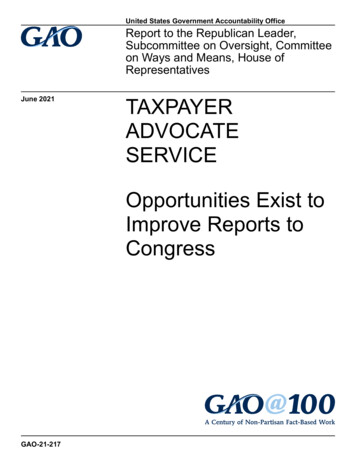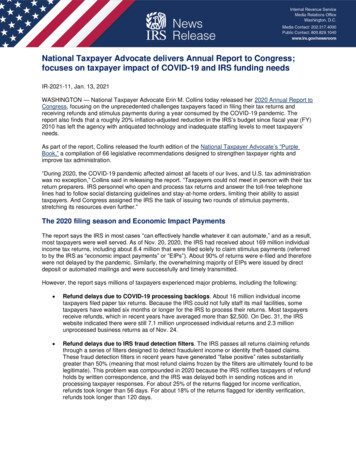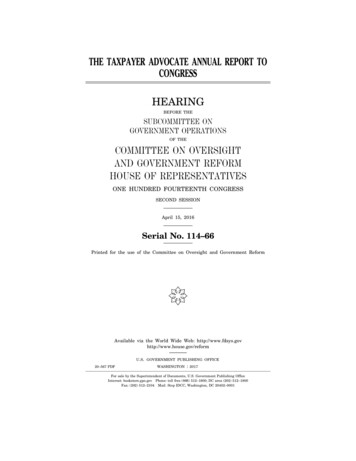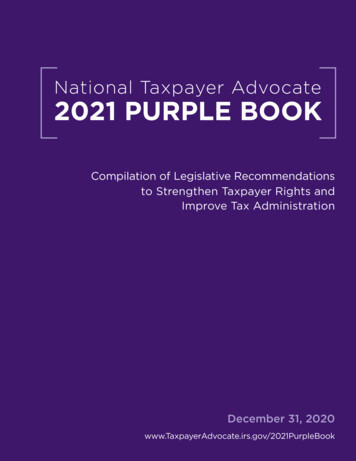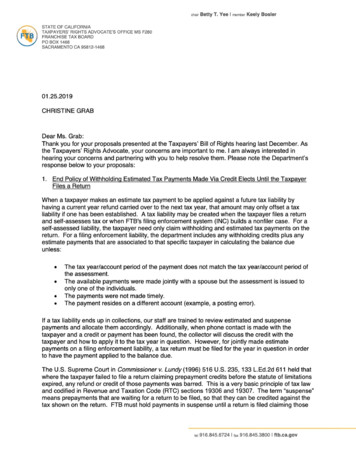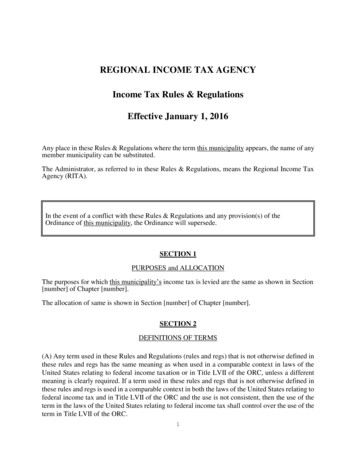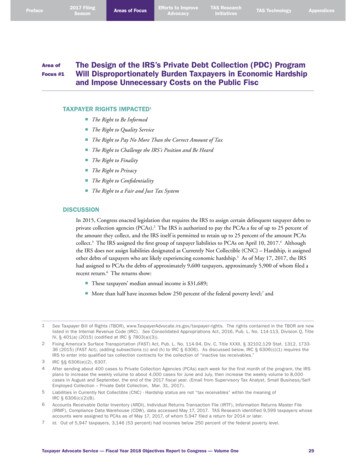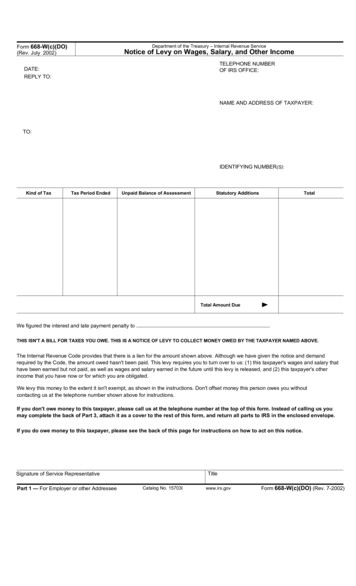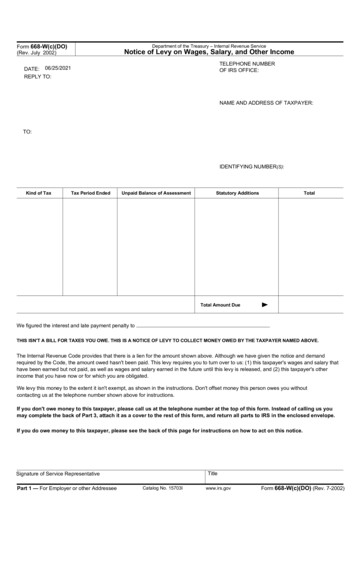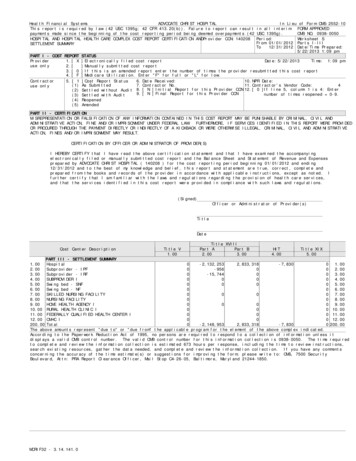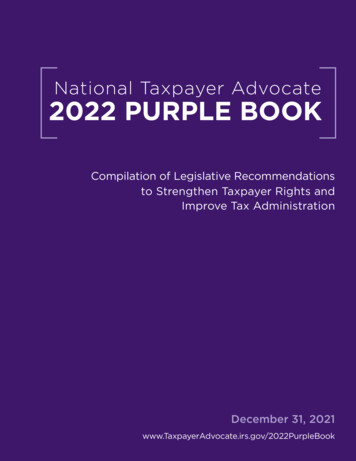
Transcription
National Taxpayer Advocate2022 PURPLE BOOKCompilation of Legislative Recommendations to Strengthen Taxpayer Rights andImprove Tax AdministrationDecember 31, 2021www.TaxpayerAdvocate.irs.gov/2022PurpleBook
Table of ContentsTABLE OF CONTENTSINTRODUCTION . . . . . . . . . . . . . . . . . . . . . . . . . . . . . . . . . . . . . . . . . . . . . . . . . . . . . . . . . . . . . . . . . . . . . . . . . . vSTRENGTHEN TAXPAYER RIGHTS AND TAXPAYER SERVICE1. Elevate the Importance of the Taxpayer Bill of Rights by Redesignating It asSection 1 of the Internal Revenue Code . . . . . . . . . . . . . . . . . . . . . . . . . . . . . . . . . . . . . . . . . . . . . 12. Revamp the IRS Budget Structure and Provide Sufficient Funding toImprove the Taxpayer Experience and Modernize the IRS’s InformationTechnology Systems . . . . . . . . . . . . . . . . . . . . . . . . . . . . . . . . . . . . . . . . . . . . . . . . . . . . . . . . . . . . . 3IMPROVE THE FILING PROCESS3. Treat Electronically Submitted Tax Payments and Documents as Timely IfSubmitted Before the Applicable Deadline . . . . . . . . . . . . . . . . . . . . . . . . . . . . . . . . . . . . . . . . . . 74. Authorize the IRS to Establish Minimum Competency Standards for FederalTax Return Preparers . . . . . . . . . . . . . . . . . . . . . . . . . . . . . . . . . . . . . . . . . . . . . . . . . . . . . . . . . . . . 95. Require the IRS to Work With Tax Software Companies to IncorporateScanning Technology for Individual Income Tax Returns Filed on Paper . . . . . . . . . . . . . . . . 126. Extend the Time for Small Businesses to Make Subchapter S Elections . . . . . . . . . . . . . . . . 147. Adjust Individual Estimated Tax Payment Deadlines to Occur Quarterly . . . . . . . . . . . . . . . . 168. Harmonize Reporting Requirements for Taxpayers Subject to Both theReport of Foreign Bank and Financial Accounts and the Foreign AccountTax Compliance Act by Eliminating Duplication and Excluding AccountsMaintained by U.S. Persons in the Countries Where They Are Bona Fide Residents . . . . . . 179. Adjust the Filing Threshold for Taxpayers Filing as Married Filing Separatelyand Nonresident Alien Individuals . . . . . . . . . . . . . . . . . . . . . . . . . . . . . . . . . . . . . . . . . . . . . . . . 1910. Amend the Lookback Period for Allowing Tax Credits or Refunds UnderIRC § 6511(b)(2)(A) to Include the Period of Any Postponement of Time forFiling a Return Under IRC § 7508A . . . . . . . . . . . . . . . . . . . . . . . . . . . . . . . . . . . . . . . . . . . . . . . . 21IMPROVE ASSESSMENT AND COLLECTION PROCEDURES11. Require That Math Error Notices Describe the Reason(s) for the AdjustmentWith Specificity, Inform Taxpayers They May Request Abatement Within 60Days, and Be Mailed by Certified or Registered Mail . . . . . . . . . . . . . . . . . . . . . . . . . . . . . . . . . 2312. Continue to Limit the IRS’s Use of “Math Error Authority” to Clear-CutCategories Specified by Statute . . . . . . . . . . . . . . . . . . . . . . . . . . . . . . . . . . . . . . . . . . . . . . . . . . 2513. Require Independent Managerial Review and Written Approval Before theIRS May Assert Multiyear Bans Barring Taxpayers From Receiving CertainTax Credits and Clarify That the Tax Court Has Jurisdiction to Review theAssertion of Multiyear Bans . . . . . . . . . . . . . . . . . . . . . . . . . . . . . . . . . . . . . . . . . . . . . . . . . . . . . . 2814. Allow Additional Time for Taxpayers to Request Abatement of a Math ErrorAssessment Equal to the Additional Time Allowed to Respond to a Notice ofDeficiency When the Math Error Notice Is Addressed to a Person Outsidethe United States . . . . . . . . . . . . . . . . . . . . . . . . . . . . . . . . . . . . . . . . . . . . . . . . . . . . . . . . . . . . . . . 31National Taxpayer Advocate 2022 Purple Booki
Table of Contents15. Amend IRC § 6212 to Provide That the Assessment of Foreign InformationReporting Penalties Under IRC §§ 6038, 6038A, 6038B, 6038C, and 6038DIs Subject to Deficiency Procedures . . . . . . . . . . . . . . . . . . . . . . . . . . . . . . . . . . . . . . . . . . . . . . 3316. Amend IRC § 6330 to Provide That “an Opportunity to Dispute” anUnderlying Liability Means an Opportunity to Dispute Such Liability in aPrepayment Judicial Forum . . . . . . . . . . . . . . . . . . . . . . . . . . . . . . . . . . . . . . . . . . . . . . . . . . . . . . 3517. Amend IRC § 6402(a) to Prohibit Offset of the Earned Income Tax CreditPortion of a Tax Refund . . . . . . . . . . . . . . . . . . . . . . . . . . . . . . . . . . . . . . . . . . . . . . . . . . . . . . . . . 3818. Require the IRS to Waive User Fees for Taxpayers Who Enter Into Low-CostInstallment Agreements or Who Have an Adjusted Gross Income Equal to orLess Than 250 Percent of the Federal Poverty Level . . . . . . . . . . . . . . . . . . . . . . . . . . . . . . . . 4019. Improve Offer in Compromise Program Accessibility by Repealing thePartial Payment Requirement and Restructuring the User Fee . . . . . . . . . . . . . . . . . . . . . . . . 4220. Modify the Requirement That the Office of Chief Counsel Review CertainOffers in Compromise . . . . . . . . . . . . . . . . . . . . . . . . . . . . . . . . . . . . . . . . . . . . . . . . . . . . . . . . . . . 4421. Amend IRC § 7122 to Require the IRS to Refund Any Payment CollectedPursuant to a Federal Tax Lien That Exceeds the Amount of an AcceptedOffer in Compromise . . . . . . . . . . . . . . . . . . . . . . . . . . . . . . . . . . . . . . . . . . . . . . . . . . . . . . . . . . . . 4522. Require the IRS to Mail Notices at Least Quarterly to Taxpayers WithDelinquent Tax Liabilities . . . . . . . . . . . . . . . . . . . . . . . . . . . . . . . . . . . . . . . . . . . . . . . . . . . . . . . . 4723. Clarify When the Two-Year Period for Requesting Return of Levy Proceeds Begins . . . . . . 4824. Protect Retirement Funds From IRS Levies, Including So-Called “Voluntary”Levies, in the Absence of “Flagrant Conduct” by a Taxpayer . . . . . . . . . . . . . . . . . . . . . . . . . . 5025. Provide Taxpayer Protections Before the IRS Recommends the Filing of aLien Foreclosure Suit on a Principal Residence . . . . . . . . . . . . . . . . . . . . . . . . . . . . . . . . . . . . . 5226. Provide Collection Due Process Rights to Third Parties Holding Legal Titleto Property Subject to IRS Collection Actions . . . . . . . . . . . . . . . . . . . . . . . . . . . . . . . . . . . . . . . 5427. Extend the Time Limit for Taxpayers to Sue for Damages for ImproperCollection Actions . . . . . . . . . . . . . . . . . . . . . . . . . . . . . . . . . . . . . . . . . . . . . . . . . . . . . . . . . . . . . . 5628. Direct the IRS to Implement an Automated Formula to Identify Taxpayers atRisk of Economic Hardship . . . . . . . . . . . . . . . . . . . . . . . . . . . . . . . . . . . . . . . . . . . . . . . . . . . . . . 5829. Revise the Private Debt Collection Rules to Eliminate the TaxpayersIntended to Be Excluded by the Taxpayer First Act . . . . . . . . . . . . . . . . . . . . . . . . . . . . . . . . . . 60REFORM PENALTY AND INTEREST PROVISIONS30. Convert the Estimated Tax Penalty Into an Interest Provision to ProperlyReflect Its Substance . . . . . . . . . . . . . . . . . . . . . . . . . . . . . . . . . . . . . . . . . . . . . . . . . . . . . . . . . . . 6231. Apply One Interest Rate Per Estimated Tax Underpayment Period . . . . . . . . . . . . . . . . . . . . . 6432. Pay Interest to Taxpayers on Excess Payments of Estimated Tax to theSame Extent Taxpayers Must Pay a Penalty on Underpayments of Estimated Tax . . . . . . . . 6533. Reduce the Federal Tax Deposit Penalty Imposed on Taxpayers Who MakeTimely Tax Deposits . . . . . . . . . . . . . . . . . . . . . . . . . . . . . . . . . . . . . . . . . . . . . . . . . . . . . . . . . . . . 6734. Extend Reasonable Cause Defense for the Failure-to-File Penalty toTaxpayers Who Rely on Return Preparers to E-File Their Returns . . . . . . . . . . . . . . . . . . . . . . 68iiTable of Contents
Table of Contents35. Authorize a Penalty for Tax Return Preparers Who Engage in Fraud orMisconduct by Altering a Taxpayer’s Tax Return . . . . . . . . . . . . . . . . . . . . . . . . . . . . . . . . . . . . 7136. Clarify That Supervisory Approval Is Required Under IRC § 6751(b) BeforeProposing Penalties . . . . . . . . . . . . . . . . . . . . . . . . . . . . . . . . . . . . . . . . . . . . . . . . . . . . . . . . . . . . 7337. Require an Employee to Determine and a Supervisor to Approve AllNegligence Penalties Under IRC § 6662(b)(1) . . . . . . . . . . . . . . . . . . . . . . . . . . . . . . . . . . . . . . . 7538. Modify the Definition of "Willful" for Purposes of Finding Report of ForeignBank and Financial Accounts Violations and Reduce the Maximum Penalty Amounts . . . . 77STRENGTHEN TAXPAYER RIGHTS BEFORE THE OFFICE OF APPEALS39. Require Taxpayers’ Consent Before Allowing IRS Counsel or CompliancePersonnel to Participate in Appeals Conferences . . . . . . . . . . . . . . . . . . . . . . . . . . . . . . . . . . . 79STRENGTHEN THE OFFICE OF THE TAXPAYER ADVOCATE40. Clarify That the National Taxpayer Advocate May Hire Legal Counsel toEnable Her to Advocate More Effectively for Taxpayers . . . . . . . . . . . . . . . . . . . . . . . . . . . . . . 8141. Clarify the Authority of the National Taxpayer Advocate to Make PersonnelDecisions to Protect the Independence of the Office of the Taxpayer Advocate . . . . . . . . . 8442. Clarify the Taxpayer Advocate Service’s Access to Files, Meetings, andOther Information . . . . . . . . . . . . . . . . . . . . . . . . . . . . . . . . . . . . . . . . . . . . . . . . . . . . . . . . . . . . . . 8643. Authorize the National Taxpayer Advocate to File Amicus Briefs . . . . . . . . . . . . . . . . . . . . . . 8744. Require the IRS to Address the National Taxpayer Advocate’s Comments inFinal Rules . . . . . . . . . . . . . . . . . . . . . . . . . . . . . . . . . . . . . . . . . . . . . . . . . . . . . . . . . . . . . . . . . . . . 8945. Authorize the Office of the Taxpayer Advocate to Assist Certain TaxpayersDuring a Lapse in Appropriations . . . . . . . . . . . . . . . . . . . . . . . . . . . . . . . . . . . . . . . . . . . . . . . . . 9046. Repeal Statute Suspension Under IRC § 7811(d) for Taxpayers SeekingAssistance From the Taxpayer Advocate Service . . . . . . . . . . . . . . . . . . . . . . . . . . . . . . . . . . . 92STRENGTHEN TAXPAYER RIGHTS IN JUDICIAL PROCEEDINGS47. Expand the Tax Court’s Jurisdiction to Hear Refund Cases and Assessable Penalties . . . . 9448. Repeal Flora: Give Taxpayers Who Cannot Pay the Same Access to JudicialReview as Those Who Can . . . . . . . . . . . . . . . . . . . . . . . . . . . . . . . . . . . . . . . . . . . . . . . . . . . . . . . 9649. Authorize the Tax Court to Order Refunds or Credits in Collection DueProcess Proceedings Where Liability Is at Issue . . . . . . . . . . . . . . . . . . . . . . . . . . . . . . . . . . . . 9950. Provide That the Time Limits for Bringing Tax Litigation Are Subject to theJudicial Doctrines of Forfeiture, Waiver, Estoppel, and Equitable Tolling . . . . . . . . . . . . . . . 10151. Amend IRC § 7456(a) to Expand the Authority of the Tax Court to IssueSubpoenas for the Production of Records Held by a Third Party Prior to aScheduled Hearing . . . . . . . . . . . . . . . . . . . . . . . . . . . . . . . . . . . . . . . . . . . . . . . . . . . . . . . . . . . . 10452. Provide That the Scope of Judicial Review of Determinations UnderIRC § 6015 Is De Novo . . . . . . . . . . . . . . . . . . . . . . . . . . . . . . . . . . . . . . . . . . . . . . . . . . . . . . . . . . 10653. Clarify That Taxpayers May Raise Innocent Spouse Relief as a Defense inCollection Proceedings and Bankruptcy Cases . . . . . . . . . . . . . . . . . . . . . . . . . . . . . . . . . . . . 109National Taxpayer Advocate 2022 Purple Bookiii
Table of Contents54. Clarify That Taxpayers May Seek Innocent Spouse Relief in Refund Suits . . . . . . . . . . . . . 11155. Fix the Donut Hole in the Tax Court’s Jurisdiction to DetermineOverpayments by Non-Filers With Filing Extensions . . . . . . . . . . . . . . . . . . . . . . . . . . . . . . . . 113MISCELLANEOUS RECOMMENDATIONS56. Restructure the Earned Income Tax Credit (EITC) to Make It Simpler forTaxpayers and Reduce Improper Payments . . . . . . . . . . . . . . . . . . . . . . . . . . . . . . . . . . . . . . . 11557. Allow Taxpayers the Option of Using Prior Year Income to Claim the EarnedIncome Tax Credit (EITC) During Federally Declared Disasters . . . . . . . . . . . . . . . . . . . . . . . 11958. Exclude Taxpayers in Specific Circumstances From the Requirement toProvide a Social Security Number for Their Children to Claim the Child Tax Credit . . . . . . 12159. Clarify Whether Dependents Are Required to Have Taxpayer IdentificationNumbers for Purposes of the Credit for Other Dependents . . . . . . . . . . . . . . . . . . . . . . . . . . 12360. Allow Members of Certain Religious Sects That Do Not Participate in SocialSecurity and Medicare to Obtain Employment Tax Refunds . . . . . . . . . . . . . . . . . . . . . . . . . . 12561. Amend IRC § 36B(d)(2) to Prevent Individuals From Losing Some or All ofTheir Premium Tax Credits When Receiving Lump-Sum Social SecurityBenefits Attributable to a Prior Year . . . . . . . . . . . . . . . . . . . . . . . . . . . . . . . . . . . . . . . . . . . . . . 12762. Amend the Combat-Injured Veterans Tax Fairness Act of 2016 to AllowVeterans of the Coast Guard to Exclude Disability Severance Pay FromGross Income and File Claims for Credit or Refund for Taxes Withheld FromExcluded Income . . . . . . . . . . . . . . . . . . . . . . . . . . . . . . . . . . . . . . . . . . . . . . . . . . . . . . . . . . . . . . 12963. Encourage and Authorize Independent Contractors and Service Recipientsto Enter Into Voluntary Withholding Agreements . . . . . . . . . . . . . . . . . . . . . . . . . . . . . . . . . . . 13164. Require the IRS to Specify the Information Needed in Third-Party Contact Notices . . . . . 13365. Authorize the Treasury Department to Issue Guidance Specific toIRC § 6713 Regarding the Disclosure or Use of Tax Return Information by Preparers . . . . 13566. Expand the Protection of Taxpayer Rights by Strengthening the LowIncome Taxpayer Clinic Program . . . . . . . . . . . . . . . . . . . . . . . . . . . . . . . . . . . . . . . . . . . . . . . . 13667. Compensate Taxpayers for “No Change” National Research Program Audits . . . . . . . . . . . 13868. Establish the Position of IRS Historian Within the Internal Revenue Serviceto Record and Publish Its History . . . . . . . . . . . . . . . . . . . . . . . . . . . . . . . . . . . . . . . . . . . . . . . . 140APPENDIX 1: Additional Reference Materials for Legislative Recommendations inThis Volume . . . . . . . . . . . . . . . . . . . . . . . . . . . . . . . . . . . . . . . . . . . . . . . . . . . . . . . . . . . . . . . . . . . . . . . . . . 142APPENDIX 2: Prior National Taxpayer Advocate Legislative RecommendationsEnacted Into Law . . . . . . . . . . . . . . . . . . . . . . . . . . . . . . . . . . . . . . . . . . . . . . . . . . . . . . . . . . . . . . . . . . . . . 152ivTable of Contents
IntroductionNATIONAL TAXPAYER ADVOCATE 2022 PURPLE BOOK:COMPILATION OF LEGISLATIVE RECOMMENDATIONS TO STRENGTHENTAXPAYER RIGHTS AND IMPROVE TAX ADMINISTRATIONINTRODUCTIONSection 7803(c)(2)(B)(ii)(IX) of the IRC requires the National Taxpayer Advocate, as part of the annual reportto Congress, to propose legislative recommendations to resolve problems encountered by taxpayers. This year,we present 68 legislative recommendations.We have taken the following steps to make these recommendations as accessible and user-friendly as possiblefor Members of Congress and their staffs: We have consolidated our recommendations from various sections of this year’s report, prior reports, andother sources into this single volume. We have grouped our recommendations into categories that generally reflect the various stages in the taxadministration process so that, for example, return filing issues are presented separately from audit andcollection issues. We have presented each legislative recommendation in a format like the one used for congressionalcommittee reports, with “Present Law,” “Reasons for Change,” and “Recommendation(s)” sections. Where bills have been introduced in the past that are generally consistent with one of ourrecommendations, we have included a footnote at the end of the recommendation that identifiesthose bills. (Because of the large number of bills introduced in each Congress, we almost surely haveoverlooked some. We apologize for any bills we have inadvertently omitted.) We have compiled a table, which appears at the end of this volume as Appendix 1, that identifiesadditional materials relating to our recommendations, where such materials exist. In addition toidentifying a larger number of prior bills than we cite in our footnotes, the table provides references tomore detailed issue discussions that have been published in prior National Taxpayer Advocate reports.By our count, Congress has enacted approximately 50 legislative recommendations that the National TaxpayerAdvocate has proposed. See Appendix 2 for a complete listing. That total includes approximately 23provisions that were included as part of the Taxpayer First Act.1The Office of the Taxpayer Advocate is a non-partisan, independent organization within the IRS thatadvocates for the interests of taxpayers. We have dubbed this the “Purple Book” because the color purple, asa mix of red and blue, has come to symbolize bipartisanship. Historically, tax administration legislation hasattracted bipartisan support. Most recently, the Taxpayer First Act was approved by both the House and theSenate on voice votes with no recorded opposition.We believe most of the recommendations presented in this volume are non-controversial, common sensereforms that will strengthen taxpayer rights and improve tax administration. We hope the tax-writingcommittees and other Members of Congress find it useful.1Taxpayer First Act, Pub. L. No. 116-25, 133 Stat. 981 (2019). We say Congress enacted “approximately” a certain number of NationalTaxpayer Advocate recommendations because in some cases, enacted provisions are substantially similar to what we recommendedbut are not identical. The statement that Congress enacted a National Taxpayer Advocate recommendation is not intended to implythat Congress acted solely because of the recommendation. Congress, of course, receives suggestions from a wide variety ofstakeholders on an ongoing basis.National Taxpayer Advocate 2022 Purple Bookv
IntroductionWe highlight these ten legislative recommendations for particular attention, in no particular order: Revamp the IRS Budget Structure and Provide Sufficient Funding to Improve the TaxpayerExperience and Modernize the IRS’s Information Technology Systems. Since FY 2010, the IRSbudget has been reduced by nearly 20 percent after adjusting for inflation. Largely as a result of thesebudget reductions, the IRS cannot provide top quality service or enforce the law with fairness to all. Forexample, the IRS finished the 2021 filing season with a backlog of 35.3 million returns that requiredmanual processing. When taxpayers called the IRS for assistance, only about 11 percent reached a CSR,with hold times for taxpayers who got through averaging about 23 minutes. In addition, the IRS’s ITsystems desperately need upgrades. In FY 2021, the IRS collected about 4.1 trillion on a budget ofabout 11.9 billion, producing a remarkable average return on investment of about 345:1. Additionalfunding for the IRS would not only improve taxpayer service but would almost surely increase revenuecollection. Amend the Lookback Period for Allowing Tax Credits or Refunds Under IRC § 6511(b)(2)(A) toInclude the Period of Any Postponement of Time for Filing a Return Under IRC § 7508A. Taxeswithheld from wages and estimated tax payments are generally deemed paid on the tax return filingdeadline of April 15. To be timely, a taxpayer’s claim for credit or refund generally must be filed withinthree years from the date the return was filed or two years from the date the tax was paid, whicheverperiod is longer. If the taxpayer files a refund claim within three years from the date the return wasfiled, the taxpayer can only get a credit or refund of excess amounts paid within the preceding threeyears, plus six months (i.e., the lookback period) if the taxpayer obtained a six-month extension forfiling the original return. However, a taxpayer who filed pursuant to a “postponement” granted by theIRS because of a federally declared disaster will not recover excess amounts paid within the period ofpostponement.Because of the pandemic, the IRS postponed the tax return filing deadline to July 17 in 2020 and toMay 17 in 2021. These postponements of the filing deadline limit the amounts that taxpayers canrecover in a way that was not intended and that will cause some taxpayers to lose the ability to recoveroverpayments. For example, a taxpayer who filed her 2019 return by the postponed filing deadline ofJuly 15, 2020, might reasonably believe she would be eligible for a refund if she files a claim before July15, 2023. However, if her taxes (withholding payments) are deemed paid on April 15, 2020, any claimfor credit or refund filed after April 15, 2023, would be disallowed by the IRS. This is a trap for theunwary. We recommend Congress extend the lookback period when the filing deadline is postponed bythe IRS due to a disaster declaration to three years plus the period of the postponement. Authorize the IRS to Establish Minimum Competency Standards for Federal Tax Return Preparers.The IRS receives over 160 million individual income tax returns each year, and paid tax return preparersprepare the majority of these returns. Both taxpayers and the tax system depend heavily on the abilityof preparers to prepare accurate tax returns. Yet numerous studies have found that non-credentialed taxreturn preparers routinely prepare inaccurate returns, which harms taxpayers and tax administration. Toprotect the public, federal and state laws generally require lawyers, doctors, securities dealers, financialplanners, actuaries, appraisers, contractors, motor vehicle operators, and even barbers and beauticiansto obtain licenses or certifications and, in most cases, to pass competency tests. Taxpayers and the taxsystem would benefit from requiring tax return preparers to pass minimum competency tests.The IRS sought to implement minimum standards beginning in 2011, including passing a basiccompetency test, but a U.S. Court of Appeals affirmed a U.S. district court opinion that held the IRSlacked the authority to impose preparer standards without statutory authorization. The plan the IRSrolled out in 2011 was developed after extensive consultation with stakeholders and was supportedby almost all such stakeholders. We recommend Congress authorize the IRS to reinstitute minimumcompetency standards.viIntroduction
Introduction Expand the Tax Court’s Jurisdiction to Hear Refund Cases and Assessable Penalties. Under currentlaw, taxpayers who owe tax and wish to litigate a dispute with the IRS must go to the U.S. Tax Court,while taxpayers who have paid their tax and are seeking a refund must file suit in a U.S. district courtor the U.S. Court of Federal Claims. Although this dichotomy between deficiency cases and refundcases has existed for decades, we recommend Congress give all taxpayers the option to litigate their taxdisputes in the U.S. Tax Court. Due to the tax expertise of its judges, the Tax Court is often betterequipped to consider tax controversies than other courts. It is also more accessible to less knowledgeableand unrepresented taxpayers than other courts because it uses informal procedures, particularly in certaindisputes that do not exceed 50,000 for one tax year or period. Restructure the Earned Income Tax Credit (EITC) to Make It Simpler for Taxpayers and Reducethe Improper Payments Rate. TAS has long advocated for dividing the EITC into two credits: (i) arefundable worker credit based on each individual worker’s earned income, despite the presence of aqualifying child, and (ii) a refundable child credit. For wage earners, claims for the worker credit couldbe verified with nearly 100 percent accuracy by matching claims on tax returns against Forms W-2,reducing the improper payments rate on those claims to nearly zero. The portion of the EITC that variesbased on family size would be combined with a child credit into a larger family credit. The NationalTaxpayer Advocate published a report making this recommendation in 2019, and we continue toadvocate for it. Expand the Protection of Taxpayer Rights by Strengthening the Low Income Taxpayer Clinic(LITC) Program. The LITC program effectively assists low-income taxpayers and taxpayers whospeak English as a second language. When the LITC grant program was established as part of the IRSRestructuring and Reform Act of 1998, IRC § 7526 limited annual grants to no more than 100,000per clinic. The law also imposed a 100 percent matching requirement. A clinic cannot receive morein LITC grant funds than it is able to match. The nature and scope of the LITC program has evolvedconsiderably since 1998, and those requirements are preventing the program from providing high qualityassistance to the largest possible universe of eligible taxpayers. We recommend that Congress removethe per-clinic cap and allow the IRS to reduce the match requirement to 50 percent if doing so wouldprovide coverage for additional taxpayers. Clarify That Supervisory Approval Is Required Under IRC § 6751(b) Before Proposing Penalties.IRC § 6751(b)(1) states: “No penalty under this title shall be assessed unless the initial determinationof such assessment is personally approved (in writing) by the immediate supervisor of the individualmaking such determination. ” At first, it seems a requirement that an “initial determination” beapproved by a supervisor would mean the approval must occur before the penalty is proposed. However,the timing of this requirement has been the subject of considerable litigation, with some courtsholding that the supervisor’s approval might be timely even if provided after a case has gone throughthe IRS Independent Office of Appeals and is in litigation. Very few taxpayers choose to litigate theirtax disputes. Therefore, to effectuate Congress’s intent that the IRS not penalize taxpayers in certaincircumstances without supervisory approval, the approval must be required earlier in the process. Werecommend that Congress amend IRC § 6751(b)(1) to require that written supervisory approval beprovided before the IRS sends a written communication to the taxpayer proposing a penalty. Require That Math Error Notices Describe the Reason(s) for the Adjustment With Specificity,Inform Taxpayers They May Request Abatement Within 60 Days, and Be Mailed by Certified orRegistered Mail. Under IRC § 6213(b), the IRS may make a summary assessment of tax arising froma mathematical or clerical error, as defined in IRC § 6213(g). When the IRS does so, IRC § 6213(b)(1)requires that it send the taxpayer a notice describing “th
advocates for the interests of taxpayers. We have dubbed this the "Purple Book" because the color purple, as a mix of red and blue, has come to symbolize bipartisanship. Historically, tax administration legislation has attracted bipartisan support. Most recently, the Taxpayer First Act was approved by both the House and the
